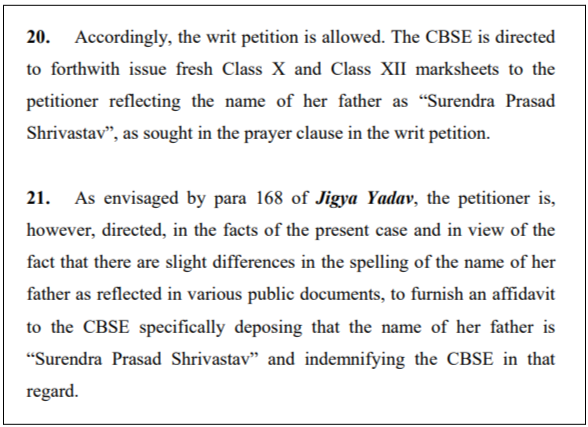In this edition of court judgements, we look at the Supreme Court’s judgement that when there’s direct evidence proving the accused’s guilt, the motive becomes insignificant, that people have the right to be free from Climate Change’s adverse effects, that contesting candidates need not disclose each and every moveable property owned by them or their dependents, Delhi HC’s order that right to be correctly identified is fundamental to a person’s identity, among others.
SC: People have the right to be free from Climate Change’s adverse effects
In the case of MK Ranjitsinh and Others vs. Union of India and Others before the Supreme Court, the writ petition was filed to protect Great Indian Bustards (GIBs) due to their declining population and the serious threat they face. In response to the petition, in April 2021, the Court ordered restrictions on overhead transmission lines across a large area of about 99,000 square kilometres. The Court emphasized the need for underground power lines, especially in the habitats of GIBs. It appointed a committee to assess the feasibility of converting high-voltage power lines underground. The Court also mandated the installation of bird diverters on existing overhead lines in GIB areas and instructed that where feasible, all overhead lines should be converted to underground within a year.
The Committee implemented the Court’s order, granting approvals where undergrounding of power lines wasn’t feasible. Respondents, including key ministries, sought modification of the order citing adverse impacts on India’s power sector and energy transition, lack of consultation, international commitments to non-fossil fuels, technical challenges in undergrounding, and concerns about pollution from alternative energy sources.
The Bench of Justices JB Pardiwala and Manoj Misra modified the Apex Court’s above order. Observing that it is best to leave the issue to the domain experts, the Court asked the committee to submit a report by 31 July 2024 upon examining the report holistically.
While passing the order, the Bench also discussed the issue of climate change in the country. It observed that Article 48A deals with the obligation of the State for environmental protection while Article 51A(g) highlights citizens’ duty to care for nature. Further, it noted that even though there isn’t a specific right recognized against climate change’s impacts, Articles 14 (equality before law and the equal protection of laws) and 21 (right to life and personal liberty) pave the way for people’s right to be free from the adverse effects of climate change. It also emphasized the growing severity of climate change which highlights the importance of establishing this right as a separate and distinct one.
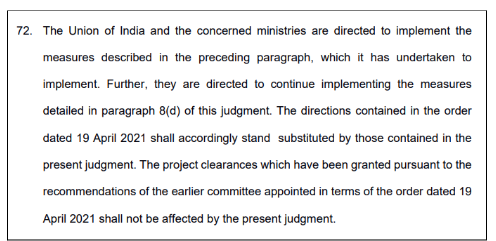
SC: When there’s direct evidence proving the accused’s guilt, the motive becomes insignificant
The appellant in the case, Chandan vs. State (Delhi) was convicted under Section 302 of IPC for committing a daylight murder. The eyewitness to the crime was thoroughly cross-examined by the defence and nothing emerged to discredit her testimony. She detailed the events, describing how the accused fatally stabbed the victim and how she witnessed it from close range, all happening quickly. The accused was apprehended on the same day near the crime scene with the knife, confirmed by forensic analysis to be the weapon used in the crime, with the victim’s blood matching that found on the knife recovered from the accused. The conviction and sentence of the Trial Court were upheld by the High Court as well.
The defence’s argument was that there was no established motive for the accused for the murder. However, the Supreme Court Bench of Justices Sudhanshu Dhulia and PB Varale held that in a case where the eyewitness testimony is solid and not challenged, the motive doesn’t matter much. The court noted that all the evidence presented by the prosecution convincingly proves the guilt of the accused and dismissed the appeal.
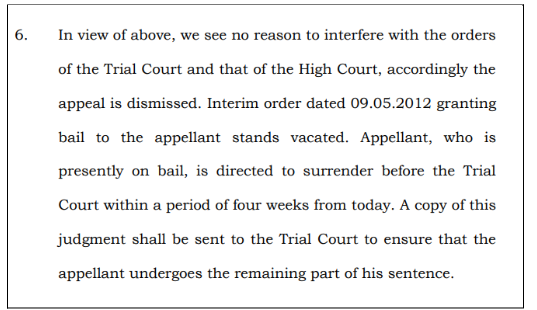
SC: Election candidates need not disclose each and every moveable property owned by them or their dependents
Karikho Kri, who won as an independent MLA from Arunachal Pradesh’s Tezu Assembly constituency in 2019, faced an Election Petition from Congress candidate Nuney Tayang challenging the election result in Kri’s favour. Tayang’s petition sought to nullify Kri’s election, alleging that Kri provided inaccurate information in his nomination papers and failed to disclose the three vehicles owned by his wife and son. It was also claimed that Kri didn’t submit necessary “no dues certificates” for rent, electricity, and telephone charges. The High Court nullified Kri’s election because he didn’t meet the nomination paper requirements of Section 33 of the Representation of the People Act, making them liable for rejection under Section 36(2)(b) of the same Act.
Kri then appealed to the Supreme Court in Karikho Kri vs. Nuney Tayang. The Supreme Court Bench of Justices Anirudhha Bose and Sanjay Kumar observed that candidates contesting elections need not disclose each and every moveable property owned by them or their dependents unless they are of substantial value or reflect a luxurious lifestyle. Further, it added that candidates shouldn’t have to reveal every detail of their lives to voters. Their right to privacy remains intact, especially regarding matters unrelated to their suitability for public office. Not disclosing every asset doesn’t necessarily mean there’s a significant problem with their candidacy, it held and quashed the High Court’s order. It held Kri’s candidature valid.
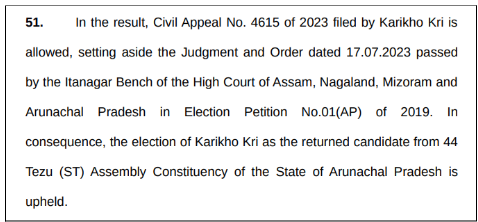
Kerala HC: Schools should maintain proper playgrounds
This writ petition was filed by the President of the Parent Teachers Association and the Managing Committee Member of the Government Welfare Lower Primary School in Kerala, challenging the decision of the district panchayat to construct a water tank on the school grounds. The plan to construct the water tank was then dropped and the matter had become infructuous. Acknowledging this, the Kerala High Court emphasized the significance of playgrounds in schools such as improving the physical skills of the children like flexibility and balance motor skills, hand-eye coordination and heart and lung function, along with social skills, cognitive skills, and emotional skills. Education should not be restricted in classrooms, it stated.
The court referred to Chapter IV Rule 3 of the Kerala Education Rules, emphasizing that every school must have appropriate playgrounds for games and sports, with adequate clear space as per the rule. It noted that some authorities are exploiting the lack of specific guidelines under these rules and avoiding maintaining proper playgrounds. The court ordered that these guidelines must be formulated within four months. If schools don’t follow this, it can end in even closure of the school.
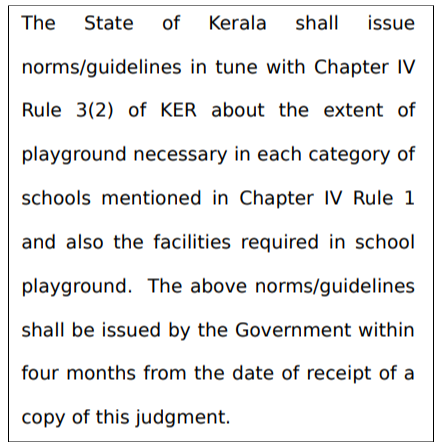
Delhi HC: Right to be correctly identified is fundamental to a person’s identity
In Pragati Shrivastava vs. the Secretary, Central Board Of Secondary Education and another, the petitioner had filed a plea seeking a direction on the CBSE that her father’s name be changed from her Class X and XII mark sheets.
Justice C Hari Shankar of the Delhi High Court referred to an old Supreme Court Judgement which stated that discrepancies between public documents and school records regarding an individual’s name are not crucial. However, the CBSE could protect itself by obtaining an affidavit from the candidate or including a disclaimer on the certificate stating that any name change is at the candidate’s request based on public documents provided by them.
The High Court also emphasized that the court needs to take a realistic approach in these situations, understanding that a person’s name is crucial as it identifies who they are and their family lineage. This right to be correctly identified is fundamental to a person’s identity, so the Court should grant genuine name change requests when requested. In this case, the Delhi High Court allowed the plea and directed the CBSE to issue fresh Class X and Class XII marksheets to the petitioner reflecting the changed name of her father.
